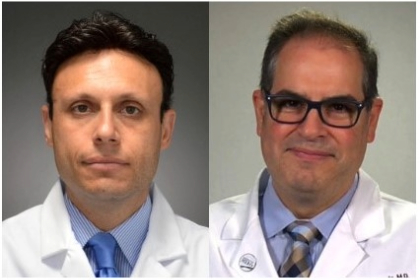(JANUARY 18, 2024) Nephrologist Marios Prikis, M.D., associate professor of medicine, and transplant surgeon Jaime Pineda, M.D., assistant professor of surgery, commented to WCAX for a story on living donors for kidney transplants.

Nephrologist Marios Prikis, M.D., associate professor of medicine and medical director of pancreas and kidney transplant programs at UVMMC (left), and transplant surgeon Jaime Pineda, M.D., assistant professor of surgery
(JANUARY 18, 2024) Nephrologist Marios Prikis, M.D., associate professor of medicine, and transplant surgeon Jaime Pineda, M.D., assistant professor of surgery, commented to WCAX for a story on living donors for kidney transplants.
Dozens of Vermonters wait years for kidneys, a process that’s only gotten lengthier. According to the University of Vermont Medical Center (UVMMC), patients on average wait at least two to three years to get a kidney transplant, and in some instances up to seven years.
That’s why doctors are encouraging living donors. Many people may not be aware that the human body, which contains two kidneys, can function perfectly well with just one. Doctors say living donations are better for patient outcomes and have less risk associated with transporting a deceased donor’s kidney from elsewhere.
“It’s thoroughly and strictly investigated, examined for them to be approved. And then similarly the recipient goes through a thorough process,” said Prikis, who is medical director of pancreas and kidney transplant programs at UVMMC. “So both of them and then it’s an elective surgery on an elective day. Both good for the patients but also for the team.”
At UVM, the doctors say 30 percent of their kidney transplants are from living donors, but the goal would be well over 50 percent because a living donor can take years off the wait.
“Our living donors are increasing, but we have a population that probably will be very eager to donate more. And we need many more living donors in our area,” Pineda said.
Officials say 78 patients in the UVM Health Network are currently waiting for a kidney, there were 27 deceased organ donors last year, and there are three scheduled living kidney surgeries this month.
The University of Vermont Medical Center has comprehensive information about becoming a living kidney donor.
Read full story
at
WCAX-TV